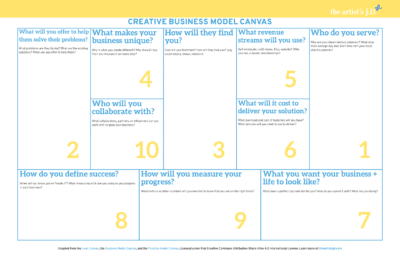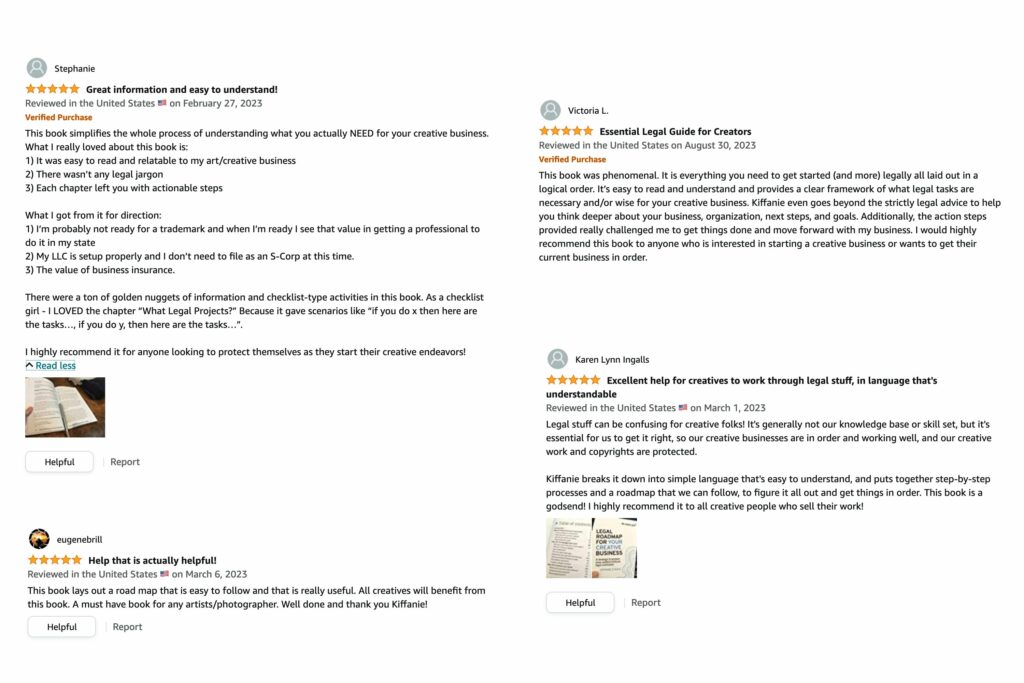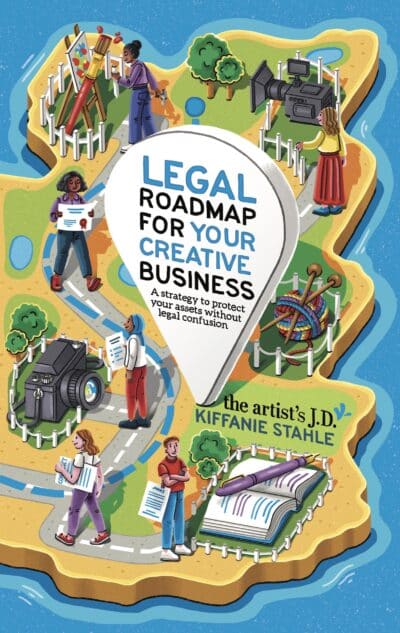This blog post contains affiliate links. (These can be spotted by the text [affiliate link] or an * placed after the link.) I use these links because the small commission I make allows me to keep creating intuitive, practical legal (and biz) resources. Plus it never changes the price you pay.
Besides running the artist’s J.D., I run a law firm.
And when I’m meeting with new law firm clients for the first time, my questions often throw business owners off. And that’s because I ask questions that aren’t typical for your lawyer to ask.
You might expect your lawyer to ask things like,
- Who owns the business? At what percentage? What was their original investment?
- Are you an LLC? A corporation?
- Do you keep records of all the LLC/corporation’s decisions as Unanimous Written Consents?
- If a corporation, do you hold shareholder and board of directors meetings at least yearly?
- Is your business name a registered trademark? Are any of your product or service names registered trademarks?
- Do you have a contract that you use with your clients/customers?
- Do you have employment agreements and an employee manual?
- What are your biggest legal threats?
- What kind of insurance does your business have?
But that’s not what I ask; instead, I want to know,
- What are your goals? Short-term? Long-term?
- What’s your timeline for meeting these goals?
- What does success look like for you?
- What is the biggest block in reaching that success that you can control?
- What’s the biggest block in reaching that success that is out of your control?
- What changes will you need to make to your business to get there?
- Are there things you need to add, remove, or keep doing to reach success?
- How will you know when you’ve attained success?
- What results will you see when you meet your goals?
- How will you feel when you reach your goals?
(These questions are my version of the client intake framework from Book Yourself Solid by Michael Port*.)
And while a business owner might expect these questions from a coach, they aren’t expecting them from their attorney.
But there’s no way to prioritize your legal projects unless you know where your business is going.
3 reasons a “Creative Business Legal Checklist” is often a waste

Reason #1. Lawyers write a legal to-do list so you’ll hire them
As business owners, we’ve been told repeatedly to create free content to show the value of our services. And that’s what these checklists put out by law firms, lawyers, and legal service providers are: showing value so you’ll hire that business.
Some are designed to overwhelm you, some to scare you, and some come from a helpful place. But all are hoping that you’ll see the list and hire them to do one (or more) of the tasks.
(And yes, I have six must-do legal tasks that I discuss in my book*. But all of these are tasks you can easily handle, and I guide you through each one!)
Reason #2. Legal projects are a waste of time if they don’t help you reach your goals
Often creative business owners want me to give them a checklist. And while I love a good checklist, there’s no one-size-fits-all checklist.
Because certain legal projects are a waste of your time and money if they won’t help you reach your version of success.
Because of that, when I create these checklists for my clients, the content and order of the checklists change based on their goals.
So unless you are given the tools to customize these checklists, you’ll just be wasting time on projects that aren’t growing your business.
Reason #3. I saw how overwhelming they were to creatives
As I’ve said, my mission is to inject ease into the legalese of running a creative business.
So this last one comes down to how I saw creatives using my original stab at a checklist.
The fact of the matter was, even when I grouped the checklist into categories, told them they were free to rearrange the order of the categories, or even cross some categories out, they still either did everything or nothing.
For those that were Type A and wanted to cross everything off the list. (As I discussed above, some tasks were a waste of time because they weren’t necessary (or necessary at that point) based on the products/services they offered.)
Those overwhelmed by the long list and who did nothing were unnecessarily opening themselves up to legal liability because they didn’t know how to prioritize and start small.
What you should do instead
This means your first step to prioritizing your legal projects list has nothing to do with the law.
It requires that you get clear on where you are taking your business. You need to know exactly where you are going and what ruler you are measuring yourself against.
Because your version of success determines the projects and order. Your goal effectively prioritizes and eliminates projects.
But coming up with your version of success isn’t always easy. And requires you to:
- dig in and figure out what you want
- admit what you think you deserve
- put your hopes and dreams on paper (and then have to look at them when they don’t happen)
And that’s exactly what the Legal Roadmap book* helps you do.
Create a one-sheet plan

The first section helps you do a step most people skip! (And is the key to creating a personalized legal to-do list.) And that’s preparing a simple reference point for your business that you can use to quickly decide if that new idea, trend, or business “must-do” will help your business grow. Or if it is something you can pass on for now.
By the end of this section, you’ll have a simple 1-sheet plan you’ll use to simplify and streamline your business.
Do “enough” legal tasks
Next, you’ll get “enough” legal stuff done. For some, these might be the only legal tasks you have to complete! For others, these will set you up so that you can focus on legal tasks that will help you grow your businesses.
Either way, by the end, have “enough” legal stuff done to launch your business or keep your existing business out of legal hot water.
Create a personalized legal to-do list
The final section is where I turn you loose to choose your adventure. I’m not going to give you any legal tasks. Instead, I guide you to learn which legal tasks help you meet your business goals.
You’ll wrap up the book with a personalized legal to-do list of projects that help you achieve your business goals.
That’s a wrap!
I’ve seen that this process results in way less stress, confusion, and wasting time on unnecessary tasks for my clients and members of the artist’s Courtyard, my membership community.
But I’m not just asking you to trust me on this. Here are some of the Amazon reviews for the book:


Want help getting all your legal ducks in a row?
Feeling overwhelmed by the legal side of your business? You’re not alone. Then the Legal Roadmap book is your go-to guide.
Legal Roadmap for Your Creative Business breaks down the essentials into bite-sized, actionable steps that fit into your already busy life.
Designed for creative minds, this book helps you prioritize what really matters—without getting lost in legal jargon.
Whether you’ve been running your creative business on the side or you’re finally ready to take it to the next level, this roadmap is your step-by-step guide to protecting your assets without the headache.
Start adding ease to the legalese today!
(If you use the above Amazon affiliate link, I’ll make a small commission, but it doesn’t change the price you pay.)
Still, trying to figure out if this process is a good fit? You can learn more about the one-sheet plan and the questions involved in creating it in this blog post.

Hi! I’m Kiff! I’m your friendly legal eagle (and licensed attorney).
My goal is to add ease to the legalese. And because I think basic legal resources should be available to every creative, I create a lot of free content.
If I’ve created something that has helped inject a little ease into your creative business and you would like to say “thank you”, you can make a contribution here.
If you’d like to hear more from me, I’d love to pop into your inbox every Friday morning to share additional ways to cut through the red tape and inject a little ease.
Get tips from your friendly legal eagle in your inbox…
Your privacy is important to us. Learn how we protect it here.

